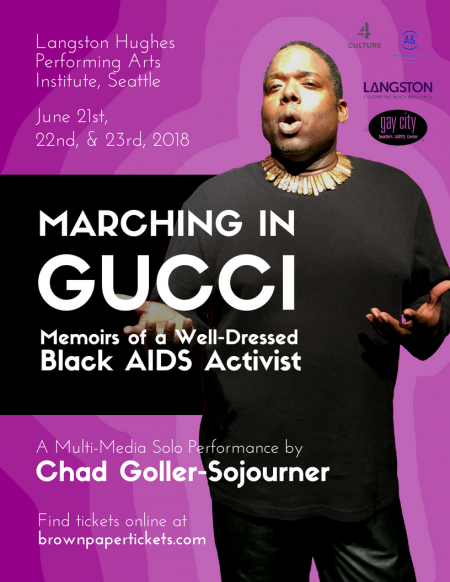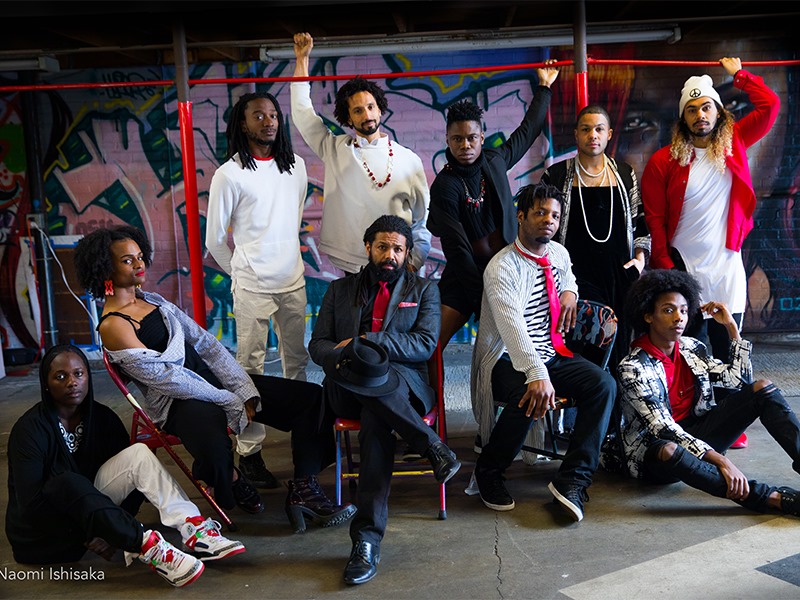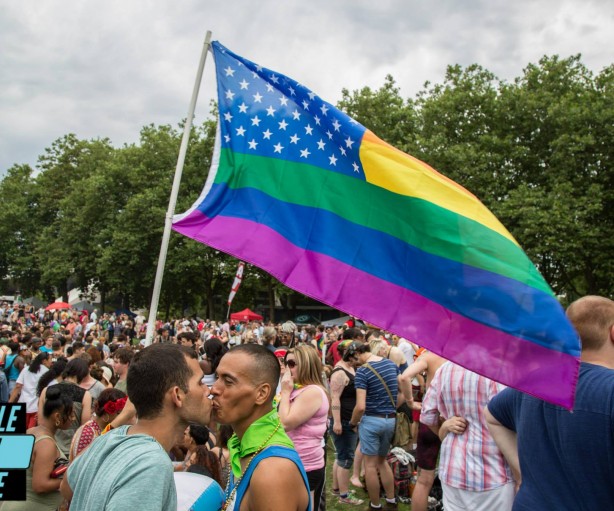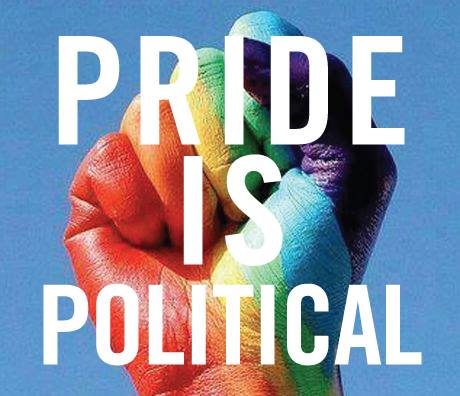Don’t Miss: Spend Pride with “Marching in Gucci,” Sermons in Shade, and Communion in Red Velvet: Chad Goller-Sojourner @ Langston This Weekend
Marching in Gucci: Memoirs of a Well-Dressed Black AIDS Activist Tells a Story — with Humor and Defiance — of Those Who Fought for Their Own While the Country Witnessed in Silence.
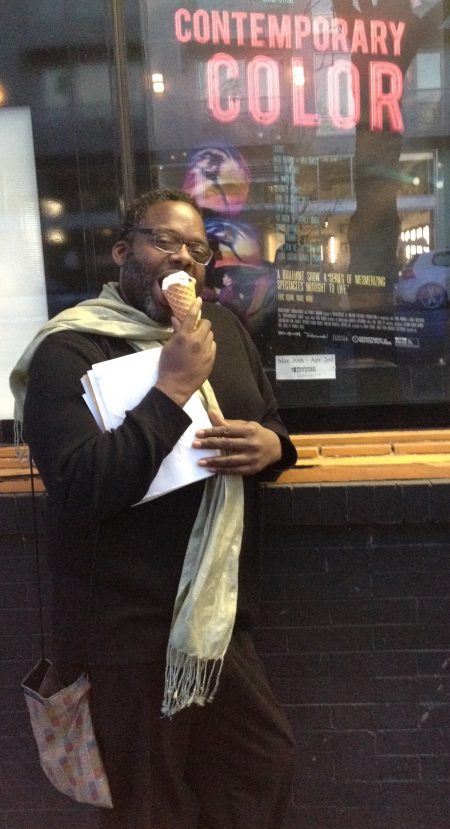
The artist known as Chad Goller-Sojourner holding court before an appearance last year on “The Seattle Process with Brett Hamil” at NW Film Forum. Photo by R Barron.
Chad Goller-Sojourner is about the only person I’ve seen who can take up the role of a Reverend in one story and, in the next, take you with him down the dingy halls of a seedy gay theater, without making you doubt the sincerity of his salvation.
In this and other ways, Goller-Sojourner is an amalgamation. He is a Black man raised by White parents near Tacoma, which as a teenager left him, in his words, short on “Black people skills” but an advanced practitioner in “dealing-with-White-people skills.” His fit within the “small, yet vibrant and politically active Black community” around him began to take hold in college at Western, and further still when he moved across the country.
Goller-Sojourner has spent most of his life in the Northwest, but throws style and shade with all the flair of a Manhattan street queen, and abides with all the Southern hospitality of Aunt Hattie swooping in with several armloads of home cooking after church. (Of note: ever the church lady, Goller-Sojourner does indeed cater after-church receptions by the trunkload, as well as run a seasonal one-man, Southern-inspired baking company — Uncle Peaches’ Cakes & Cobblers, with his “‘Taste and See the Goodness of the Lord’ Dessert Ministry” serving delicacies like “‘I’ll Take Your Man’ Strawberry Rhubarb Sauce” and his famous “Ms. Emma’s 7-Up Pineapple Coconut Cake.”)
And the core of what his latest show centers around. After moving to New York City toward the end of college, he ran smack into the AIDS Epidemic, and thereafter committed countless hours to caring for others, while engaging in conflicting, self-harming behaviors — drugs, eating disorders, and more — with the next breath.
Goller-Sojourner takes us back to a time when contracting HIV was like a certain death sentence; when AIDS was a mysterious killer that decimated with terrible speed:
“This was pre-AIDS Cocktail time. The life span between diagnosis and death was often not long. You could look fine at Christmas and be dead by Easter. Sooner if you were poor and black.”
To a time when the “Religious Right” praised their God for the slaughter of those whom they viewed as evil and undeserving of God’s love freely given to everyone else; when parents disowned their gay children and refused to claim their lifeless bodies; when friends, even acquaintances or community volunteers, cared for those in their last stages, and attended so many funerals they had lost count.
The result in Goller-Sojourner’s show is a somber remembrance: of all the people lost far too young, from a killer they may not yet have heard of, due in part to a government that cared little and helped even less.
But it’s also an ode to righteous defiance: as the name might suggest, Marching in Gucci is not only about the AIDS Crisis, but those who defiantly took to the streets in protest of the silence and apathy (from the government) and greed (from the drug manufacturers) that allowed the Epidemic to spread with such deadly speed. It’s about the lesbians, who “made up the AIDS crisis’ greatest, and least-appreciated, heroes,” who despite the unchecked misogyny in much of the gay community, “dropped everything and provided comfort and care to those same men.”
It’s about the quiet, human compassion that existed among those same activists in caring for the sick and dying, being with them, and witnessing their stories.
“Like Ella Peter before his body became so riddled with AIDS and toxic medication that he has not left his apartment in weeks, eaten in days, speaking no longer worth the effort. . . . ‘Did I tell you about the times I danced for Kings, Queens, and Heads of States? Make sure you tell that story. You know, the one where I was beautiful.’”
Goller-Sojourner’s mission is to remember, uncover, teach, and remind — and therefore it’s a piece as well about the often-ignored fact that HIV and AIDS are still out there, claiming new victims — the CDC estimated nearly 40,000 people in the U.S. were diagnosed with HIV in 2016 alone, and notes that racial minorities, particularly Black Americans, are disproportionately affected.
This all can be a very depressing story — and I’m not going to lie, there are many moments when tearful convulsions are right there on the horizon. (In past showings, a segment showing barely-living, hollowed-out bodies while the religious song Beautiful Things plays is a leading tear-jerker.)
But the skill of Goller-Sojourner’s artistry is captured not only in his ability to depict the throes of the Epidemic many of us did not have to witness first-hand, but his ability to deliver truths with a quick, dry humor, too.
This version of Marching in Gucci is completely reworked from prior versions, now divided into two acts and with more multimedia aspects, additional stories and a revised order — the best version yet, in my view based on the new script, and quite worth witnessing again even if you’ve seen a previous version.
For those who complain about Pride being too drunk or too corporate, Marching in Gucci is a chance to feel real pride: pride in the strength and compassion of those who came before, pride for those who endured far more death and suffering than one should have to bear, and pride in the resiliency of a community that has marched on, through the Epidemic, innumerable forms of discrimination, fights for fundamental rights, and scores of years where courts and corporations shunned queer communities, to a point where we now have to seek out a depth of community again to get away from the bigness of corporatized Pride.
Marching in Gucci seeks to welcome you back into the fold — of pride, of community, of spiritual fullness — this weekend. There might even be Communion of red velvet cake in it for you.
Marching in Gucci: Memoirs of a Well-Dressed Black AIDS Activist, written and performed by Chad Goller-Sojourner, 6/21-6/23 (7:30 pm Thursday & Friday, 3:30 & 7:30 Saturday). Tickets $20, available here or at the door.
Read an interview with Goller-Sojourner by Lola E. Peters in the South Seattle Emerald, here.


